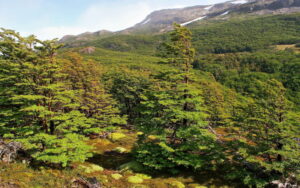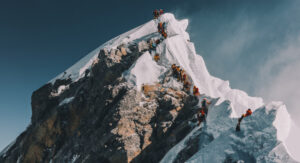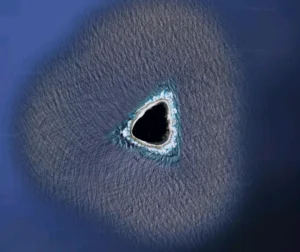When Guillaume Moreau and Nicolas Roulx left Baker Lake, in Canada’s southern Nunavut territory, they believed the worst was behind them.
Their 7,600km, almost north-to-south journey through Canada had begun months earlier, on frigid Ellesmere Island in March. Moreau and Roulx had endured, rather than enjoyed, their 800km ski from the Eureka weather station to the small Inuit town of Resolute. The opening slog of their four-part mega-journey from northern Ellesmere Island to southern Canada had been extremely taxing.
Their second ski section proved easier, after avoiding the open water of Barrow Strait with a 70km plane ride from Resolute to Somerset Island. Despite mostly whiteout conditions, Moreau, Roulx, and Jacob Racine then covered the 600km to Gjoa Haven in just 24 days, in the much milder weather of late spring.
Moreau feared that the first canoe section could be the crux of their journey. They would navigate a dangerous, technical web of waterways, stretching through Canada’s wild interior and taking them south. When they arrived, the rivers were still thawing. They had to make route changes on the fly. But ultimately, the section proved relatively safe.
“We didn’t see this struggle coming.”
Moreau hadn’t considered the second canoe section to be as difficult: “We hadn’t looked at this section as much because we had been focused on the skiing and the first canoe section, which was very technical. We didn’t see this struggle coming.”
With new addition Catherine Chagnon, Moreau, Roulx, and Debois left Baker Lake on a 1,100km journey to Black Lake. The opening section of the route involved lots of upriver paddling, but it was the horrendous weather that derailed them.

The team before leaving Baker Lake. Photo: Expedition AKOR
“There was lots of hauling but the rivers went OK,” Moreau explained, “but every time we were on a big lake, we were windbound. It wasn’t difficult to paddle, it was impossible.”
They were only able to paddle for 10 of their first 18 days. For the other eight days, they battened down the hatches and hid from the weather. Like sardines, the five of them crammed into a single tent. Their second tent could not withstand the ferocious wind.
Tried everything
“We tried everything,” Moreau said, “nighttime paddling, 3 am starts, just trying to find a weather window to make progress.”
But the wind continued to whip up huge waves. By day 20, they realized they wouldn’t make it to Black Lake. They would need a supply drop.
Thanks to a contact back in Resolute, they improvised a food pickup at a lodge on Kasba Lake, which lies right on the border of Nunavut, the Northwest Territories, Manitoba, and Saskatchewan. But progress was so slow that the extra 14 days of food was not quite enough. The team had to ration their eating to make up the shortfall.

The team needed many portages. Photo: AKOR Expedition
While paddling up the “astonishing, huge, physically demanding” Kazan River to Kasba Lake, they were constantly hungry. But their sacrifice paid off. Eventually, they managed to build up a six-day food buffer. As if by magic, they had turned days of hardship into enough supplies to continue their expedition.
Changing their route
To get back to Black Lake from Kasba Lake, they would have had to go north and west, adding many extra kilometers. Instead, they headed directly south.
“It was a very shitty line,” Moreau told me. Filled with portages and transitions, it was exactly the kind of journey that causes injuries, both to paddlers and their beasts of burden: the canoes.

The team’s progress is marked by black waypoints. The red line shows their original route plan. Photo: Expedition AKOR
The canoes required constant maintenance but they held up, and so did the team. “We’re now very skinny, but we still have energy. It’s probably the hardest line we’ve ever done, but we mostly enjoyed it,” Moreau told ExplorersWeb from a truck stop somewhere in Saskatchewan.
It took them 20 days from the lodge on Kasba Lake to hit their first road of the entire expedition. They were eating plentifully again, but the weather was still dreadful. “During the 57 days of this section, we only saw the sun for 10 days. Brutal is a good way to describe it,” Moreau said.
But it wasn’t all violent wind and weather that would make even the Scots wince. There was beauty too. “We encountered huge herds of caribou, a grizzly bear with her cubs, and a muskox that chased Etienne [Debois]. Fortunately, muskox don’t eat humans and it stopped after 100m!”

Muskox are not usually dangerous, but a rutting male took exception to Debois’s presence on his turf. Photo: Expedition AKOR
Now, the team is enjoying a return to civilization. They’ve swapped the canoes for bicycles and the team has expanded to six. Isabella Donati-Simons and Beatrice Lafreniere will accompany them for the next 35 days to Point Pelee National Park in southern Ontario.
On October 2 they left the dirt road they had been on since swapping to bicycles and transitioned to asphalt. They will cross into Manitoba this week. They still have almost 4,000km to go, but at least they will not be windbound as often on their bikes.

As winter closes in, the expedition — now six people — hits the pavement on its last, long section by bike to the southern tip of Canada. Photo: AKOR expedition






